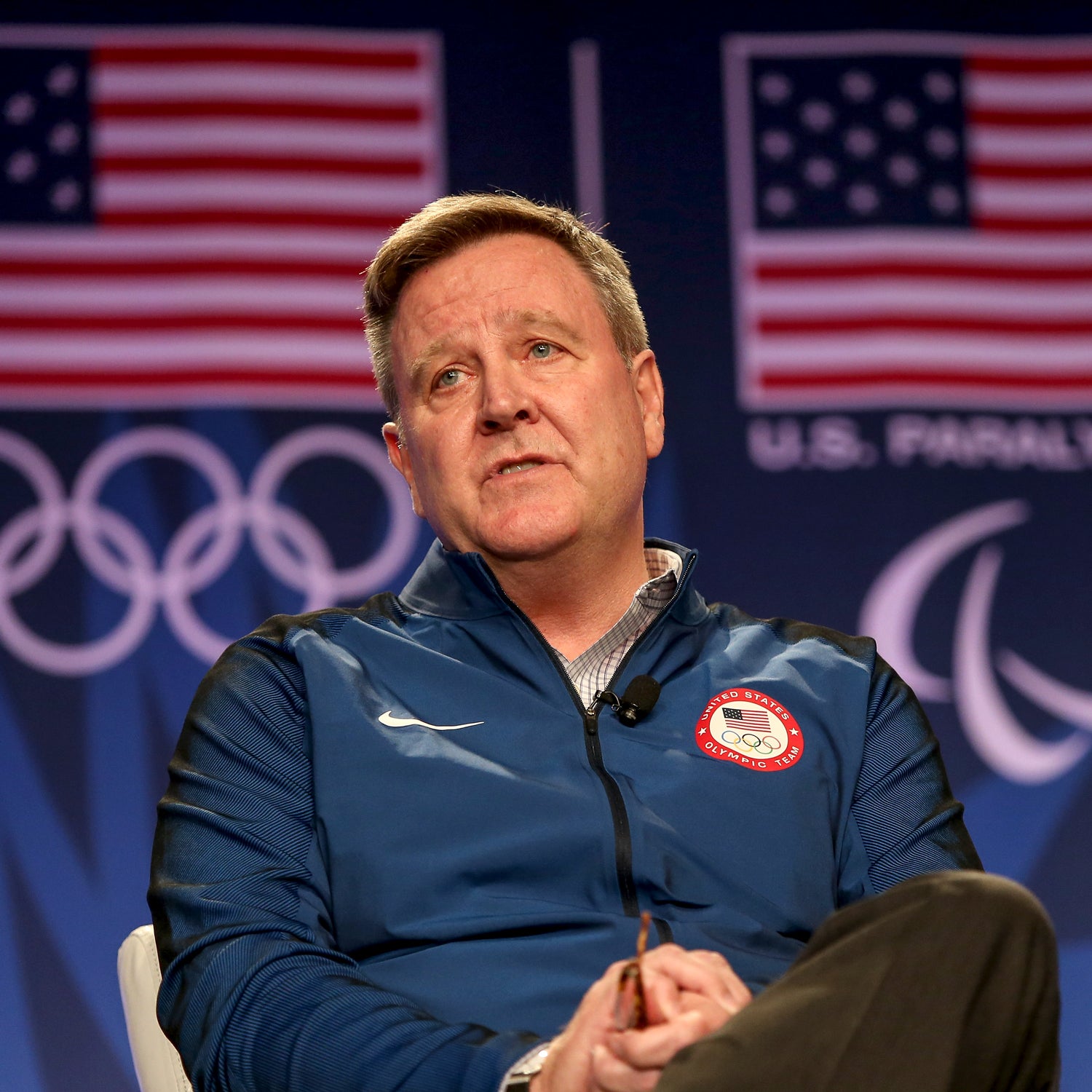On Wednesday, Scott Blackmun . The public rationale: health problems. Blackmun had been recently diagnosed with prostate cancer.
But anyone following the news surrounding this beleaguered organization knows that this was nothing more than an inevitable public relations move. The organization has been taking heavy fire of late, for both its chronic mishandling of sex abuse scandals in several Olympic sports and for the lavish salaries and bonuses it hands out to employees, while leaving athletes to essentially fend for themselves. The ranks of critics calling for Blackmun’s resignation had only been growing. Parting ways with the face of the organization was a good move, but the USOC has yet to do anything serious enough to change its culture or signal that it’s committed to protecting American athletes. Doing that will require a complete reimagining of the entire structure of U.S. Olympic sports.
First, let’s review the tape. Top leadership of the USOC, as well as the leadership of USA Gymnastics, that sport’s governing body, knew in 2015 that team doctor Larry Nassar was suspected of sexually assaulting young female gymnasts. Yet both stayed quiet even as the F.B.I. began eyeing Nassar in July of that year. It was only the reporting of the Indianapolis Star that finally dragged Nasser out into the light. The paper’s exposed rampant abuse of athletes that included vaginal and anal penetration with his fingers, touching breasts, and rubbing genitals. . The shame of the USOC, and of Blackmun, can never be smoothed away.
But the ripples of shame go far beyond USOC headquarters. USA Gymnastics not only kept silent about Nassar. It possessed . When the parent of a gymnast accused Nassar, its then-president, Steve Penny, allegedly urged her to tell no one and allow the organization to alert authorities. It was the Boston Catholic church abuse scandal all over again. In late January, , far too late to help any of the victims.
The corruption doesn’t stop with the USOC or gymnastics, either. In 2014, two years before Nassar was exposed, this magazine published a searing story by Rachel Sturtz detailing how USA Swimming, that sport’s governing body, stymied sexual abuse victims and wove a culture of cover-up going back decades. Four years before that, ESPN ran an on its ���ϳԹ��� the Lines show.
The rot underlying all these scandals is built into the structure of the so-called “Olympic movement,” a teetering edifice managed by the International Olympic Committee. Legally, the IOC is a non-profit, private organization based in Switzerland. In reality, it’s a giant sports entertainment production company that, like many businesses, would like to enforce a monopoly. It cares deeply about its brand. Stories highlighting rampant sexual abuse, doping scandals, and corrupt business practices damage that brand. And so, like all companies, the IOC engages in an enormous amount of ass-covering and revisionist history, everything from hiding the to the papering over of the biggest doping scandal since the days of East Germany—the state-sponsored cheating by Russia that was exposed at great personal risk by whistleblowers. What did those whistleblowers get for that courage? The IOC’s “Olympic Athletes from Russia” farce during the Pyeongchang games. That, naturally, was followed by Russia’s
The USOC is also a private organization, but it’s helpful to think of it more as the American subsidiary of the IOC. The American government, however, does not treat it like a business. With the 1978 (now called the Ted Stevens Olympic and Amateur Sports Act), Congress chartered the USOC and gave it monopoly powers. The act was a Cold War-era response to the Iron Curtain’s sports superiority. It appoints the USOC to “serve as the coordinating body for amateur athletic activity in the United States directly related to international amateur athletic competition”; to “recognize eligible amateur sports organizations as national governing bodies for any sport that is included on the program of the Olympic Games or the Pan-American Games”; and to “facilitate, through orderly and effective administrative procedures, the resolution of conflicts or disputes that involve any of its members and any amateur athlete, coach, trainer, manager, administrator, official, national governing body, or amateur sports organization….”
The word “amateur” is now anachronistic——but the rules established by the act nonetheless still hold. If you’re an American athlete with elite international ambitions, or even elite national ambitions (outside of the NCAA), you have to deal with both the USOC and whatever national governing body the organization designates to rule over your sport, like USA Gymnastics or USA Swimming. That includes wearing whatever brand said governing body signs a lucrative deal with during Olympic competitions, even if it’s unlikely you’ll see much of that money or if it conflicts with the deal you’ve made with another sponsor that actually subsidizes your training.
The law also appears to allow the USOC and member governing bodies to investigate themselves. That’s how a tragedy on the scale of the Nassar abuse happens. Abused American athletes face a Catch-22. If you make noise, and enemies, inside USA Gymnastics, where will you go to compete in your sport? What happens to all the years of training, the money spent, the sacrifices made? So when the attorney from your governing body shoves a non-disclosure agreement under your nose—or your parents’ noses—and demands silence in exchange for a little cash under the threat of taking away your dream if you refuse, what do you do?
Replacing USOC’s chief executive does nothing to fix these problems. The solution? As : “Knock it down.” If the USOC really wants reform, it should give up its absolute power and dissolve itself. Congress should also get out of the business of appointing sports monopolies and rescind the Ted Stevens Act. The U.S. competed in the Olympics from 1896 through 1976 without an institutionalized USOC or a sports act. We’ll be fine without them.
Such bold actions aren’t likely, of course, but smaller revolutions are possible. One excellent step has already been taken. A new for sports personnel to not report suspected sexual or other abuse. It also designates the United States Center for SafeSport, a creation of former Olympic swimmer Nancy Hogshead-Makar, as an independent investigator and clearing house for complaints.
The USOC could also ban non-disclosure agreements between individuals affiliated with clubs, governing bodies, and the USOC itself. It could give up its reliance on binding arbitration and allow American athletes to access the U.S. court system when disputes arise, as should be their right. That way, athletes would be better protected against retaliation from governing bodies for reporting suspected misbehavior.
In addition, USOC needs to put an end to its athlete ombudsman system, which is currently a sham. The ombudsman is , a clear conflict of interest. Instead, allow and encourage athletes to unionize with wholly independent unions to which they can go with suspicions of sexual assault or any other abuse. is already underway, but there could easily be a U.S.-only union for Olympic sports athletes, akin to the NFLPA or the MLBPA.
IOC and USOC leadership like to portray themselves as selfless do-gooders toiling for the sake of brotherhood through sports, . Chuck Wielgus, the former executive director of USA Swimming, who, abuse victims allege, acted to protect the organization and not the athletes, made more than $900,000 a year. . Those are the salaries of big business, putting the lie to the Olympic kumbaya pretense and underscoring yet again that athletes are “content” for a sports entertainment complex. Speed skaters, skiers, swimmers, runners, pole vaulters are part of Against that complex, they have too few rights and protections. Which is how girls can wind up in the hands of a Larry Nassar. Don’t expect any of that to change just because Scott Blackmun has resigned.


